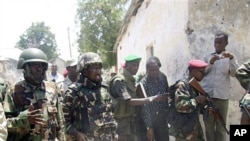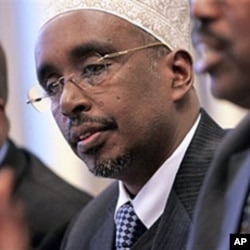With the end of the mandate for the Transitional Federal Government looming, the Somali political structure is in disarray over questions of legitimacy and leadership in the war-torn country. Established in 2004 and backed by the United Nations, the TFG was originally tasked to deliver national elections and a new constitution by August of this year.
But Somalia is no closer to achieving either of those goals than it was in 2004, and the government is now facing an unclear future.
Somali member of parliament Hassan Haji Ibrahim says the inertia in the Somali government has been mainly due to constant infighting among the country’s leaders, particularly among the president, speaker of parliament and prime minister.
A new crisis
The newest crisis in the government is no different, with politics in Mogadishu increasingly engulfed by a personal battle between President Sheikh Sharif Sheikh Ahmed and Speaker Sharif Hassan Sheikh Aden.
The dispute between the two revolves around the expiring mandate of the government. The Somali parliament sidestepped the looming deadline by simply voting in February to extend their mandate for an additional three years. The move was blasted by international backers such as the United Nations, United States and United Kingdom, but has been backed by African organizations such as the African Union and Intergovernmental Authority on Development.
In some ways, it appears as though Aden and the Somali parliament are moving to carry out the TFG’s mandate. Earlier this month, the speaker announced that presidential elections would be held in August. On Saturday, Aden announced the formation of a committee that would guide the poll. But many observers see the recent moves by Aden as part of a bid to oust President Ahmed.
Former Somali parliament member Ali Basha says the feud between the president and Speaker Aden is personal and has moved beyond the needs of the struggling country.
“They do not have the capacity of the position they are now holding. They were not politicians, they were not educated people," said Basha. "They are just people who came to power with the wish of the so-called international community. They do not trust each other, each one of them wants to stay in power. I don’t think that they can stay together.”
Clash of personalities
President Ahmed and Speaker Aden were major players in the 2008 Djibouti Peace Agreement, which ended hostilities between the Somali government and rebel Islamic Courts Union. The Islamic Courts Union, then led by Mr. Ahmed, took control of Mogadishu before being ousted by invading Ethiopian forces in 2006 on behalf of the TFG. Aden, then serving in his first term as speaker, was removed from his post after initiating talks with the ICU for a cease-fire and an end to the Ethiopian occupation.
The Djibouti talks saw elements of the ICU integrated into the TFG, with Mr. Ahmed assuming the presidency and Aden eventually regaining the speakership in early 2010.
But since that time the two have frequently clashed, most notably over the appointment of American Somali Mohammed Abullahi Mohammed as prime minister.
This is not the first time personal issues have clouded the administration of President Ahmed. Beginning in August of last year, government work was suffocated by an open power struggle between the president and then-Prime Minister Omar Abdirashid Ali Sharmarke. The struggle ended when Sharmarke resigned in late September.
But according to Rashid Abdi, an analyst for the Brussels-based International Crisis Group, the current dispute could potentially bring down the Somali government.
“This problem between the two Sharifs is a problem that has been going on for the last two years," said Abdi. "Clearly these two people have lost credibility because of this constant infighting and I think the risk of this government collapsing even before August - when the mandate constitutionally expires - is actually very real.”
Consequences for Somalia
It is reported that Speaker Aden now has the backing of Ethiopia, a major player in both the African Union and the Intergovernmental Authority on Development. Both the AU and IGAD issued decisions supporting the unilateral extension of the parliament in February.
President Ahmed has not received the same support for his government. On Sunday the Cabinet of the Transitional Federal Institutions - which includes the Presidency - voted to extend their own mandate for an additional year. But the proposal has not been backed by IGAD and was declared unconstitutional by the speaker. The United Nations - which also rejected the parliamentary extension - has similarly rejected the extension of the TFIs.
The dispute is unfolding amidst a backdrop of intense fighting between government forces and al-Qaida-linked rebels al-Shabab. At least 30 have been killed and more than 50 injured in fighting across the country in just the past few days. With just months left on its original mandate it is becoming less and less clear who will lead Somalia as it approaches uncharted territory.





